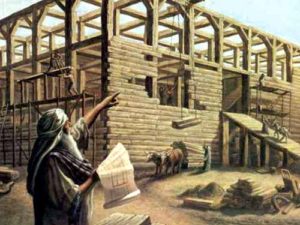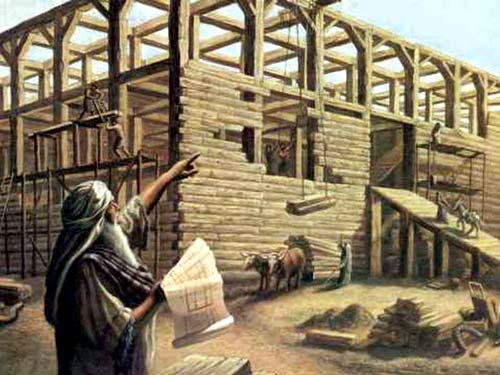Noah, Speculative Fiction, And The Biblical Narrative
 This is NOT a review of Noah, the movie. I haven’t seen it. But once again, a story inspired by Scripture is on the big screen and generating considerable conversation. The reviews of Noah and comments I’ve read ignited some thought about what we’ve come to call Biblical fiction.
This is NOT a review of Noah, the movie. I haven’t seen it. But once again, a story inspired by Scripture is on the big screen and generating considerable conversation. The reviews of Noah and comments I’ve read ignited some thought about what we’ve come to call Biblical fiction.
First, Biblical fiction must adhere to the same principles as historical fiction, unless a person is writing an alternate history. Therefore, setting details need to be as accurate as possible. Having Napoleon whip out a cell phone, for example, would be anachronistic.
There are also character issues that need to be consistent with the available records of the people involved. Hitler, for instance, should not be portrayed as loving Jews nor Abraham Lincoln as a slothful drunk (that would more nearly describe his vice president).
In addition, Biblical fiction has the burden of consistency with the larger narrative of the Bible. For that reason, the retelling of a Bible story must have the same outcome as that told in the Bible. King David could not be unrepentant of his adultery with Bathsheba and murder of her husband, in the same way that Adam and Eve could not defeat Satan and resist temptation. Why? Because of the implications such changes hold for the redemptive story–the larger narrative.
A second realization I’ve had about Biblical fiction is that not every Biblical account lends itself well to fictionalization. The backbone of fiction is conflict. While there certainly is a fair amount of conflict in the various individual narratives in Scripture, some are nothing more than a snapshot of God working.
Elijah stays with a widow and her son during a drought and God miraculously provides an unending flow of flour and oil so they won’t starve. Jesus feeds five thousand people with a few loaves and fishes. Ruth follows her mother-in-law back to Israel after the death of her husband and remarries. Peter has a dream about eating unclean animals, then preaches to a group of Gentiles.
These and many other accounts are interesting, but they don’t follow what is the commonly accepted story structure of today’s fiction. The “protagonist” doesn’t necessarily have a need or want that is driving him. There isn’t a clear adversary. Conflict isn’t at the crux of the narrative.
 Applying these thoughts to the movie, Noah, what do we see?
Applying these thoughts to the movie, Noah, what do we see?
In many ways the Biblical account of the flood is not a story. Rather, it’s the climax of a story. The actual story is that Mankind rebelled against God, to the point that He brought judgment on all but righteous Noah (Genesis 6:1-8). Then in more detail the Bible records the climax of the story–the way God brought judgment and saved Noah (Genesis 6:13-8:18).
There isn’t any conflict in this climatic event. God is in charge. Noah simply obeys and consequently survives, he and those with him.
To fictionalize a story like Noah, the writers must imagine conflict. As I understand it, the screenwriters of Noah the movie did so by (1) changing the nature of God, and (2) changing the character of Noah.
In the movie, apparently God did not clearly communicate with mankind or with Noah, resulting in conflict within the character. Was he understanding what God wanted him to do?
This stands in sharp contrast to the Biblical account: “And God said to Noah . . . [Noah] did all that God commanded him” (Genesis 6:13a, 22). Clearly, God let Noah know exactly what He wanted, down to the specifications of the ark and how many of each type of animal he was to take along. As the climax breaks, it is God Himself who seals Noah and his family into the ark. Clearly, God did not stand afar off, in obscurity, leaving things up to Noah to figure out.
Noah’s character is also clear. Throughout the Genesis account and in various other places in Scripture, he is portrayed as a righteous man (Ezekiel 14:14, for example), an individual who found favor with God. For some believers this portrayal of him is hard to fit into our theology.
We know that all have sinned, that we are saved by grace, and we don’t like the idea that God singled out Noah because of his righteousness. Where is grace in that?
Isn’t a “righteous Noah” story showing a person earning his own salvation? Better, then, if we portray Noah as a zealot about to murder his own family who chooses against his better judgment to spare them instead. Now people will see God’s grace when He rescues him.
Except, apparently God wanted to show His grace in a different way through the actual events. He did so by putting on display Noah’s faith and obedience:
By faith Noah, being warned by God about things not yet seen, in reverence prepared an ark for the salvation of his household, by which he condemned the world, and became an heir of the righteousness which is according to faith. (Heb. 11:7)
And God showed His grace through His protection–He took Noah and his family safely through the water:
He went and made proclamation to the spirits now in prison, who once were disobedient, when the patience of God kept waiting in the days of Noah, during the construction of the ark, in which a few, that is, eight persons, were brought safely through the water. Corresponding to that, baptism now saves you—not the removal of dirt from the flesh, but an appeal to God for a good conscience—through the resurrection of Jesus Christ (1 Peter 3:19b-21, emphasis added)
Through the actual events God also showed His grace in contrast to His judgment–punishing the wicked and preserving the godly:
[God] preserved Noah, a preacher of righteousness, with seven others, when He brought a flood upon the world of the ungodly (2 Peter 2:5b)
I understand that a fictionalized account of a Biblical story without conflict needs a great deal of speculation. I can see, for instance, how a writer could imagine an antagonist who would perhaps claim to be a prophet of God or of a false god, contradicting Noah’s preaching and trying to sabotage his efforts to build the ark in obedience to God.
I can see family strife resulting from the ridicule of neighbors as they mocked this hundred-year construction project. I can even see an internal struggle–worry about how Noah and his family could survive in a world where everyone else had died or fear of a God who judges righteously mixed with gratitude for His preservation.
In other words, I think it’s possible to write a story ripe with imagined conflict without violating Biblical history, God’s character, or Noah’s nature.
That’s the movie I would like to see.







































I’ve thought of this conflict between stories like Noah, and others, where I knew a good bit of changes would be in the works to get the standard movie plot to big climax in there. That was why I knew they would have major changes to Voyage of the Dawn Treader, because there is no big battle-like climax to the book. So they had to create it.
How that is done is always the crux of the matter. But watch tomorrow on my take on this issue. I just finished writing it before reading yours.
Still, that junk in Voyage of the Dawn Treader was so much bullcrap. If they even wanted points for trying, they would’ve had to try harder. I find it hard to be optimistic about Silver Chair because it’s one of the least popular books. But as long as Horse and his Boy is done and done well, I guess I’ll try to be content. At least it has a battle climax already, and they would just need to switch perspective on it.
Looking forward to what you have to say on the subject, Rick.
To be honest, I’m not a fan of the three-act structure Hollywood is married to. I think the stories become predictable and unimaginative. I’d like to see more originality in movie making.
Besides, I’m disappointed that a number of speculative readers seem willing to concede changes to significant issues, like God’s nature and Noah’s character, for the sake of story. There’s a difference between speculation and fabrication, and I think it’s we Christians who ought to recognize this and call out Hollywood for trying to pass off the latter as the former.
Becky
Like you, Becky, I’ve yet to see the movie. So I don’t know what to make of the changes. I think most of us agree that movies that don’t reflect God’s nature realistically (no one’s going to get it 100% right) are problematic and should be called out on it. But you’ve seen the reviews and you’re saying it does significantly not reflect God’s nature while Austin feels it does. So, who’s right?
As far as Noah’s depiction, based on what I’ve read, it does change him from the perceived depiction often understood by Christians, but am not clear whether it contradicts the Scripture. Noah is called righteous. But unless one equates that with a works-based righteousness instead of a relational righteousness to God–turning Noah into a near perfect man–there is plenty of leeway for allowing him to sin. As I’ve gathered by the reviews, he is depicted as faithfully doing what he believes God wants him to do, even though he struggled with it. I seriously doubt Noah did that in real life, but it is not out of the realm of possibilities, even as David committed heinous sins (he did commit murder) but is regarded as a man after God’s own heart. Unless one interprets “righteous” as equaling he never sinned, we know he did (or else we’d be contradicting Scripture that says only one man was totally free of sin), the Bible simply doesn’t tell us what his sin are, save for the instance of getting drunk and naked.
So I’d say what I’ve heard may not contradict the Scriptural depiction of Noah, though it certainly does the common Christian interpretation of the Biblical account. Not having seen it myself yet, I’m hesitant to say whether it does or doesn’t. Based on what I’ve read, however, it doesn’t follow exactly the actions of the Biblical Noah, which they admit up front.
But this goes back to my posting on the changes to Johnny Storm in the upcoming Fantastic Four movie. Many will have a problem when changes are perceived to significantly deviate from the “original” source material. Even more so when that source material is the infallible Word of God. The catch in it all is no one interpretation is necessarily infallible. I think that’s what’s happening here, and it makes people uncomfortable. It goes counter to the picture traditionally painted of what Noah was like.
This is all very interesting. I’ll have to go see it for myself soon. I’m sure that will make the producers happy.
I think the best way of understanding Scripture, and hence, God and Noah, is to let Scripture interpret Scripture.
I don’t think Scripture suggests Noah didn’t sin (his getting drunk qualifies as an example of sin, as you note).
As I mentioned in my post, though, the Bible does show God’s grace within the context of Noah’s righteousness, not his sinful behavior. The Hebrew passage is particularly strong, I think:
It wasn’t his works that made him righteous, this seems to say, but his faith, which then caused him to act in obedience to God.
But the idea of Noah’s character being fabricated in the movie is especially noticeable when the movie version is placed along side Peter’s description of him as “a preacher of righteousness.” Would a preacher of righteousness be working to destroy humankind rather than turn them from their wicked ways?
Of course his character is entwined with the misrepresentation of God who revealed Himself in Scripture as very present, the one who initiates relationship, who made clear his requirements, who gave Noah specific instructions. If the movie paints God as distant, as the reviewers all seem to agree, this is a clear fabrication. Showing Noah trying to respond in obedience to a command he’s unclear about makes him look like a fool, not a man of faith.
In the end, I think the picture the movie is portraying of Noah doesn’t sound like that of a person God equated with Daniel and Job.
Becky
Jesus said that a time would come when people who killed His disciples would think they were offering a service to God. Paul almost certainly thought he was serving God when he tried to destroy the church. Muslim terrorists think they’re serving God when they massacre innocents.
Sometimes evil people set out to do what God wants and end up sinning atrociously; they don’t know Him, after all. Depicting Noah as “faithfully doing what he believes God wants him to do” isn’t the same as depicting him as righteous.
Nobody wants Noah portrayed as sinless; we all know that righteous men are sinners. But they are still, to borrow Christ’s analogy, good trees that bear good fruit. “By their fruit you will recognize them.” A story that shows Noah righteous will do so not by his intentions (he thought murder was what God wanted!), but by his fruit.
As for David, his “heinous crimes” are not comparable to the fictional Noah’s contemplated infanticide. David committed adultery with Bathsheba, but he was never under any delusion that sleeping with his neighbor’s wife was just what God wanted him to do. He didn’t kill Uriah after an agonized decision that that was God’s will. If David had been trying to obey God, he would have done right.
And you know something? There’s an enormous difference between committing murder because you’re not trying to obey God, and committing murder because you are. And so, you see, this Noah wasn’t really like David. He was more like Saul the Pharisee.
I only compared the movie Noah to David in that they both committed “big” sins despite being called righteous. No point in getting into a “whose sin is bigger” contest. Point being, Noah could have done what he is shown in that movie doing and still be called righteous.
But if you want to compare a more one-on-one situation, it wouldn’t be Paul, but Abraham. Who did receive a message from God to commit infanticide and obviously was ready to carry it out if God hadn’t stopped him. Yet Abraham is considered righteous because of his faith in God to do what he understood God to say, despite the horror of it. Aside from the more abstract nature of Noah’s vision and his interpretation of it, he pretty much followed in Abraham’s footsteps.
Of course, I’m mainly basing this on what I’ve heard people say about it. My tune may change once I see it. All I’m saying is this depiction of Noah isn’t out of the realm of possibility and still be true to Scripture.
This article set off a lightbulb in my brain. The “plot structure” of many Bible stories does not lend itself well to adaptations, particularly film… so of course they go adding battles and angels, etc…
That’s it precisely, Julie. Hollywood has a formula they want to superimpose on stories, but Bible narratives don’t always follow. C.S. Lewis’s books don’t either. So yes, the movie makers think they have to tweak and add and alter whatever to get the story into the mold of their own making.
Becky
Excellent articel. Hollywood should have talked to you before wasting 250 million on their Noah movie. I would have much rather seen Brian Godawa’s Noah Primeval. As crazy as his version is Brain never changed the character of God or Noah. It would have made a great movie.
For those of you looking for good review of the movie Noah, check out Answers in Genesis panel discussion on their website or on YouTube.